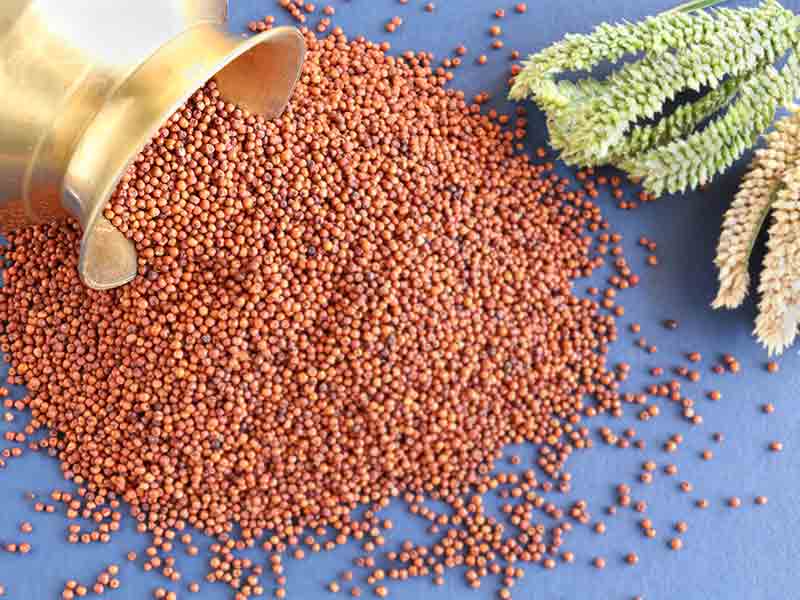Ragi grain, also known as finger millet is a cereal crop widely grown in African and Asian countries. Nutrient-dense Ragi grain is a rich source of carbohydrates, protein, B vitamins, dietary fiber, and a host of minerals like iron, calcium, potassium, and sodium. Ragi grain is ground into flour and consumed in a variety of forms. The flour is boiled either with milk or plain water and eaten as porridge. It is also made into flatbreads, roti, adai, or dosa and eaten with a variety of curries and chutneys in Indian cuisine. This staple food of south-India is gluten-free and also helps with weight-loss and diabetes.
11 Amazing Health Benefits Of Ragi Grain During Pregnancy
This wonder whole grain is packed with essential nutrients that are highly beneficial to an expecting mum. Let us find out the amazing health benefits of ragi during pregnancy.
Rich source of iron
Ragi grain is loaded with iron. Iron is a vital mineral required during pregnancy for both mother and the fetus. A lot of iron is required during pregnancy for the making of red blood cells. These red blood cells carry oxygen to all body parts of the mother and also the baby. Hence, iron requirements increase manifolds when you are expecting. It is for the same reason additional iron supplements are prescribed to a pregnant woman right from the second trimester.
Rich source of calcium
Ragi is also known to be rich in calcium. Calcium is very much essential for the formation of bones, teeth, and nails in the baby. The fetus draws its essential nutrients from the mother’s body. Therefore, it is highly essential to have sufficient amount of calcium in the expecting woman’s body. Adding ragi to a pregnant woman’s diet is thus highly recommended.
Good source of fibre
Since ragi is an unprocessed whole grain its fiber content is really high. Pregnant women are prone to constipation due to hormonal changes. Hence adding ragi to the regular diet of a pregnant woman could be greatly beneficial.
Good source of natural fat
Eating fatty foods can lead to cholesterol, hypertension, and diabetes. However, ragi is a good source of natural fat. It reduces the risk of gaining excessive weight and also supports heart health.
Aids lactation
As already mentioned ragi is a rich source of iron, calcium, and magnesium. Ragi improves hemoglobin levels in a lactating mother. Hence breastfeeding mothers should regularly consume green ragi to improve breast milk production with amino acids.
Prevents gestational diabetes
Ragi grain has high dietary fibre and polyphenols. Taking ragi regularly in the diet causes a less glycemic response. This means consuming ragi does not increase sugar levels in the blood. Due to its high fibre content compared to other grains like wheat and rice, it prevents gestational diabetes in pregnant women.
Amino acids
Ragi possesses high amino acid profile that helps in relaxation. It helps to prevent anxiety, hypertension, and headaches. The amino acid Trytophan helps to curb free radicals in the body. It also aids good sleep in a pregnant woman.
Strengthens your gut
Again the high dietary fiber content of ragi makes it an excellent whole grain that prevents constipation. It enhances normal bowel movement, retains water in the body for excretion and also strengthens your gut.
Vitamin C
Whole grain ragi has a considerable amount of vitamin C that helps to maintain a good immune system. Vitamin C improves the skin and hair of a pregnant woman and her baby.
It is gluten-free
Ragi is a wholesome grain that is free of gluten. Hence it is a wonderful substitute for people who are allergic to gluten or suffer from celiac disease. This quality of ragi makes it a completely safe food to be consumed during pregnancy. The gluten-free aspect of ragi also makes it a food that prevents unnecessary weight gain in pregnancy.
Protein dense grain
Protein is an essential nutrient that is needed in larger amounts during pregnancy. It helps in the growth and development of the unborn child in the mother’s womb. Ragi which is protein-rich helps to meet the increased protein requirements during pregnancy.
Eggless ragi grain cookies recipe
A healthy substitute to regular cookies, eggless ragi cookies are light in texture and delicious to our taste buds. A combination of ragi flour, ghee, atta, and brown sugar, ragi cookies makes a great snack.
Ingredients
- Ragi flour- ½ cup
- Wheat flour or atta- ½ cup
- Jaggery powder-1/2 cup
- Baking powder- ½ teaspoon
- Ghee or melted butter- 6 tablespoon
- Milk- 2 tablespoon or as required
- Cardamom- a pinch
Method
- Add ragi, wheat flour and powdered jaggery in a mixing bowl.
- Mix cardamom powder and baking powder to the flour and combine well
- Melt the ghee and add to the flour mixture.
- Mix everything until well combined. If the dough doesn’t come together add the milk and knead well.
- Make equal sized balls, cover and keep in the fridge for 30 minutes.
- Preheat the oven to 170C for 15 minutes.
- Flatten the balls by pressing with a fork.
- Place them on a baking tray a little apart from each other.
- Bake for 12 to 14 minutes
- Cool completely before serving or storing.
Conclusion
Ragi is one grain that is packed with major nutrients required during pregnancy and lactation. It supports the nutritional needs of an expecting mum and the growing fetus. Hence, incorporating ragi in a pregnant woman’s diet could prove to be highly beneficial throughout the course of pregnancy.
References
https://food.ndtv.com/food-drinks/benefits-of-ragi-a-wonder-grain-1400676













